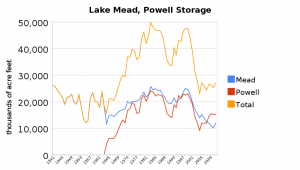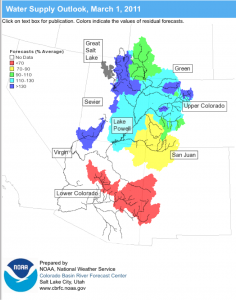The March forecast out today (pdf) for this year’s operations on the Colorado River is looking very good for the chances of extra water to be shipped downstream to help top off the dwindling supplies in Lake Mead. The magic word here is “equalization”, which means that under the river’s operating rules, there is sufficient extra water upstream in Lake Powell to allow some extra water to be released to raise Mead’s levels in the direction of “equalizing” the amount stored in each reservoir:
Reclamation estimates that an April adjustment to the Equalization Tier is very likely to occur in 2011. For this adjustment to not occur, the April-July inflow forecast volume would have to decrease from the current level (9.2 maf) to approximately 7.1 maf which would be a decrease of about 2.1 maf. In the past 32 years, only once has the forecast decreased by at least this volume from one month to the next. For this reason, Reclamation estimates the probability of an April adjustment to the Equalization Tier in 2011 to be approximately 97 percent.

Mead, Powell Storage, data courtesy USBR
Equalization, importantly, allows the Lower Basin states to get extra water above and beyond the Colorado River Compact’s requirement.
As you can see from the graph (click to biggen), which I’ve updated to include estimated storage volumes for the end of the current water year, Powell is now forecast to end the year ever so slightly below last year’s level, while Mead will see the largest increase in storage volume since the 1990s. In elevation terms, the surface of Lake Mead is now forecast, thanks to the extra water, to end the water year (Sept. 30) at 1105 feet above sea level, 21 feet above last year’s level.
The runoff is the result of a snow season that has left much of the southern Colorado Basin terribly dry, made up for by a decent snow pack in the north.

Colorado Basin Map, courtesy CBRFC
As Shaun McKinnon reported today, Arizona is sucking a very dry dusty wind right now:
The numbers — especially the runoff forecasts — spell bad news for Arizona’s streams and rivers. With so little snow in the mountains, the streams and smaller rivers will dry up sooner, leaving less moisture for riparian systems. Rivers like the San Pedro, which is dry for long stretches in good years, and the Little Colorado could have particularly bad summers.
I had much the same to say about New Mexico in a story yesterday morning (sub/ad req):
The outlook for New Mexico’s water supplies this spring is grim, federal forecasters say, after a dry February sapped what little snow the state received earlier in the winter.
“It’s not looking real great at this point,” said Wayne Sleep of the Natural Resources Conservation Service.
Tallying up the snow at a network of measurement sites around the state, Sleep and his colleagues last week forecast just half the normal flow this year on the Rio Grande into Elephant Butte Reservoir.
But the farther north you get, the better things look, and all that snow melts and flows downstream in our direction. Yay nature.


